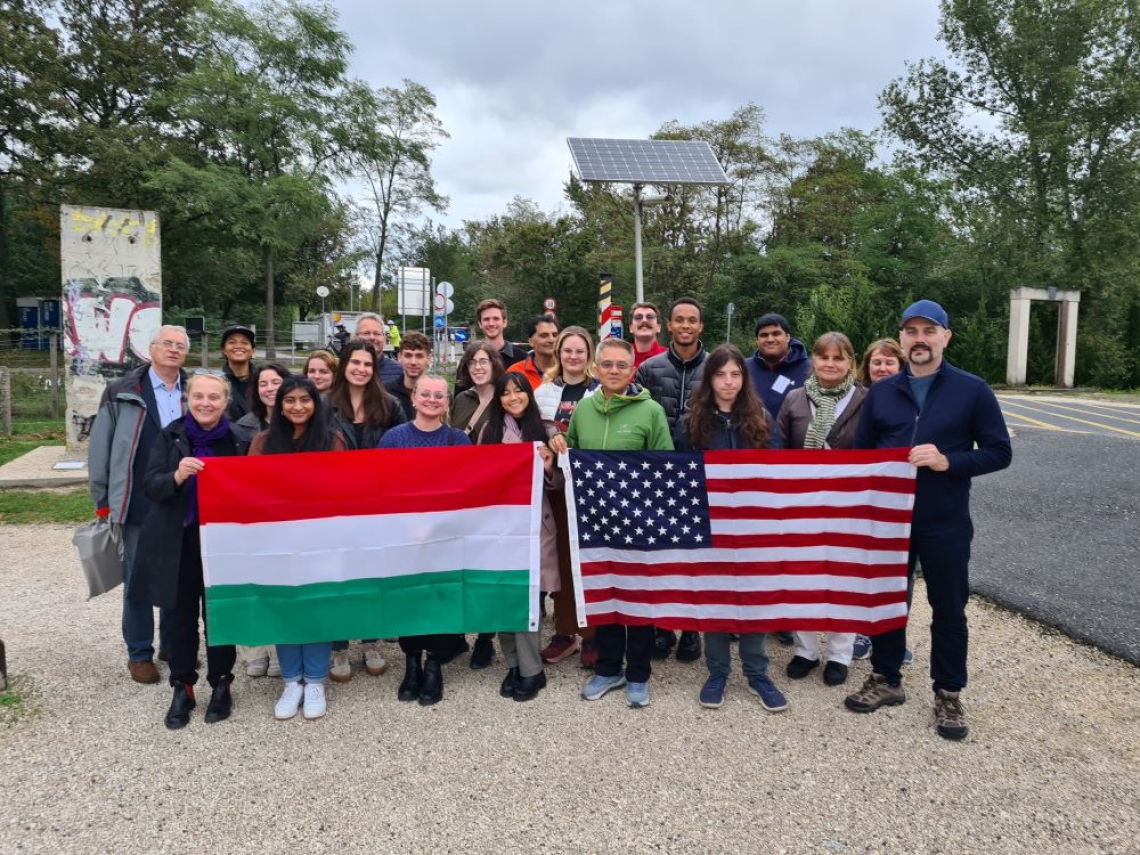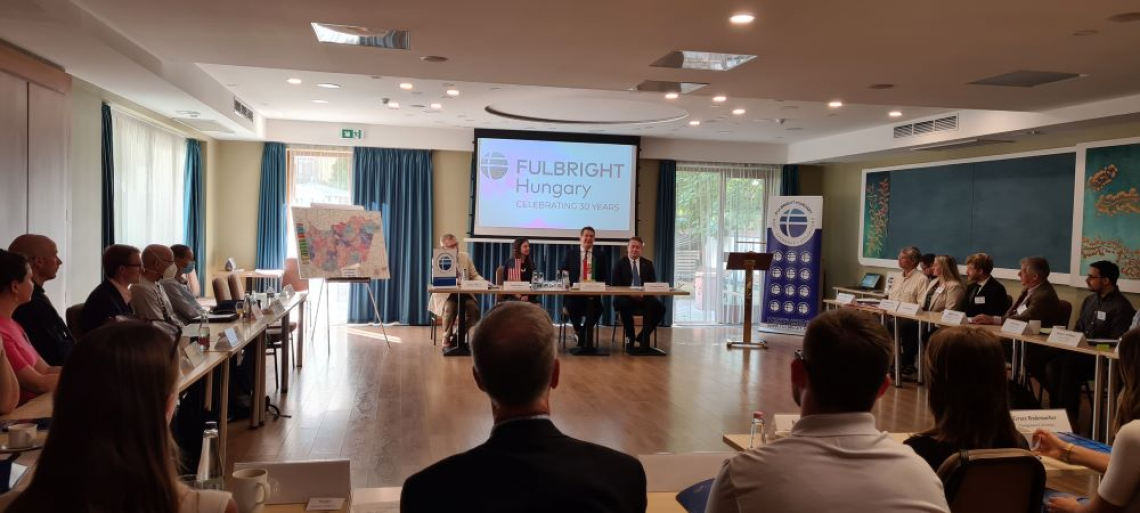Hungary
8 Open Study/Research Award
Accepted Degree Levels
|
Grant PeriodSeptember StartGrant Length9 Months |
Award Type
Award Profile

The Fulbright U.S. Student Program offers ten study/research awards per academic year for U.S. citizens holding at least a bachelor’s degree to conduct research and/or to study at a Hungarian higher education institution. Applications are welcome in all fields. The academic year is from September to the end of May. Universities have extensive international connections, and offer many study programs in English. The research institutes of the HUN-REN Hungarian Research Network (formerly known as Hungarian Academy of Sciences network) also offer young researchers the most cutting-edge, up-to-date research opportunities. Affiliations with Hungarian public institutions are preferred.
Hungary’s rich cultural traditions, competitive research and higher education institutions make our country an ideal place for young scholars to spend an academic year. Grantees enjoy robust support from the Hungarian Fulbright Commission all through their grant period. They are regularly invited to cultural enrichment programs so they get to know many different parts of the country, and as many educational and cultural institutions as possible.
Grant Length
Grant Period
The grant period will begin in September 2026 and will last through May 2027.
Orientation

The Hungarian Fulbright Commission provides a 4-day orientation program in Budapest at the beginning of September, which includes basic language and intercultural competency training and sightseeing tours. Attendance at the orientation course is expected.
Candidate Profile
Applicants are welcome in all fields of study. Preference will be given to subjects in arts, music, humanities, and social sciences as they relate to the political, social and economic changes and developing democracy in Hungary; the history and culture of Hungary and of East Central Europe; and the sciences including Mathematics. Applicants from the military or with military experience are also encouraged to apply.
Applicants must have a well-defined research project and ability to work independently. A high-level of maturity, flexibility, and ability to serve as a cultural ambassador is expected.
What is life like for Fulbrighters in the host country?
Applicants are expected to research their host country. Application materials should indicate a clear commitment to the host country community and a description of how you will engage with it.
Hungary is located in Central Europe at the intersection between East and West. It has a vibrant culture. Fulbrighters living in the country are at the heart of history, museums, beautiful architecture, monuments, and parks.
Living in Budapest and other major cities is filled with cultural activities: great exhibitions, concerts, plays, festivals – there is always a lot going on, and tickets are relatively inexpensive.
For study and research there is a plethora of resources and opportunities. Grantees should be prepared to work independently and be willing to take the initiative to maximize their experience.
Budapest is a safe city with reliable and affordable public transportation. Regional cities are also safe, and have a lot to offer. Living there is quieter, but there are many benefits. There are great restaurants, charming cafés, beautiful libraries and archives in every major city. Food and drink cost about 30% less than in the United States, and the quality is generally high.
Universities have a lot of international students and faculty, and they offer a great number of cultural opportunities and comprehensive programs.
Hungarians may be more reserved than Americans, but they are very friendly, respectful, and helpful.
Most educated and young people speak English.
The climate is moderate, similar to that of Washington, DC, but is much less humid.
Adjustment to living in a foreign country can be challenging at the beginning, but as grantees get to know the country and the people, living in Hungary is a very rewarding and life-changing experience.
Eligibility
5 Months
Degree Level of Applicant
- Bachelor's
- Master's
- Doctoral
Foreign Language Evaluation (FLE) Form
If required, submission of the Foreign Language Evaluation (FLE) form is mandatory, even if you have advanced skills or are a native speaker of the language. Failure to submit the required FLE form may impact your eligibility.
Additional Information: Hungarian language proficiency is not a requirement in the candidate selection process unless needed to successfully complete the project/study plan. If Hungarian language proficiency is important for the proposed project/study plan, those who are not proficient in Hungarian should include plans for language study in their Fulbright applications and selected applicants should begin studying the language as soon as feasible, as language abilities will greatly enhance the Fulbright experience.
Fulbright Proposal Types
Yes
Yes
Affiliation
Final affiliations will be arranged by the Fulbright Commission, but applications should contain preferred institutional placement(s) and a letter of invitation, if received.
Placement requests to non-Hungarian higher education institutions active in Hungary are less preferred. Affiliations with institutions outside of Budapest are favored. There are excellent opportunities for independent study and research at all Hungarian higher educational institutions in and outside of Budapest, such as: Debrecen, Szeged, Pécs, Veszprém, Eger, Kecskemét, and Győr, and at the institutions of the HUN-REN Hungarian Research Network. See the list of Hungarian higher education institutions on the Commission's website at www.fulbright.hu/info-for-fulbright-grantees. The Commission will also provide assistance in securing professional advice. Applicants enrolling in degree programs or courses at a Hungarian institution requiring an entrance examination must apply for admission individually. The Fulbright Commission may provide assistance in gaining admission. Exceptions are music students who wish to study at the Liszt Ferenc Academy of Music in Budapest (see Fulbright/Liszt Ferenc Academy of Music Award description).
Affiliation Fees/Tuition
Generally, a full waiver is not available for programs where tuition fees are required. In some cases partial tuition waiver can be negotiated. Tuition may be covered by the Fulbright grant up to $4,000 per academic year, but fees are considered on an individual basis.
Award Benefits
- A stipend broadly based on the cost of living in the host country. These funds may be used by the grantee to support housing, meals, and incidental costs during the grant period.
- International travel benefits
- Accident & sickness health benefits
- 24/7 mental health support line for urgent and non-urgent situations
- 12 months of non-competitive eligibility (NCE) hiring status within the federal government
Stipend Amount
This is an estimated amount and is subject to change. The financial terms of the grant will be confirmed in the grant document issued after selection.
The monthly stipend amount includes: $1,300 and HUF 120,000 (local currency allowance, appr. $300)
One-Time Allowances
This is an estimated amount and is subject to change. The financial terms of the grant will be confirmed in the grant document issued after selection.
- Excess baggage fees
- Language training allowance
- Settling in allowance
A one-time settling in allowance of $300 paid at the beginning of the grant period.
Travel allowance of up to $1,500 (reimbursement of actual cost of direct, most economical airfare and excess baggage fee against invoices/eticket paid upon arrival in Hungary).
Hungarian language course fee: if a grantee decides to study Hungarian during the grant period, course fees are covered by the Fulbright Commission up to a reasonable amount.
Additional Grant Benefits
Monthly cultural enrichment program costs are covered by the Fulbright Commission.
Estimated Cost of Living
Consider using cost of living comparison websites to gain a better understanding of the potential costs in your host country.
Cost of living in Hungary is on average about 30% lower than in the United States.
Depending on the size and quality of the apartment, housing in downtown Budapest ranges between $400-800.
Utilities, internet connection, and building maintenance fees average about $150, but could be included in the rent.
Housing and living costs in smaller cities could be somewhat lower.
Groceries for one person could typically cost between $200-250 per month. Eating out per meal costs approximately $10-30.
In-country travel costs: monthly Budapest travel pass (unlimited travel on all means of public transportation): $25, a round-trip train ticket between Budapest and another major city: $20-25
A museum admission ticket is between $10-15, concert tickets (good seats) are between $10-25
Cost of living in Hungary according to: Expatistan Website, Numbeo Website; (prices in Hungarian currency, average exchange rate: USD 1 = HUF 400)
Dependents
To be considered an accompanying dependent, the individual must be a spouse or a close relative (child, parent) who is financially dependent on the grantee and spends at least 80% of the grant period with the grantee abroad.
Dependent allowance: $100 per month for one or $200 per month for 2 or more dependents
Dependent travel allowance: $500 for one or $1,000 for two or more dependents (reimbursement of actual cost of direct, most economical airfare against invoices/eticket paid upon arrival in Hungary)
Housing Arrangements
Grantees are responsible for finding housing, but the Hungarian Fulbright Commission and/or their host institution will assist.
Country Overview
Hungary is a welcoming and safe country with rich cultural and educational traditions. The Hungarian higher education system is part of the European Higher Education Area. The country has many well-known universities with rapidly growing international connections, joint programs and many international students.
The academic year is from September to May. Semesters are typically four months in length. The second semester begins in February. Over 400 study programs in English and other languages are offered by Hungarian higher education institutions.
The Hungarian Fulbright Commission organizes an extensive orientation program for U.S. grantees. All through the grant period, grantees are regularly invited to participate in cultural enrichment programs, visits and conferences. These programs offer interesting insights into Hungarian culture, different institutions, and also foster team spirit among grantees.
Cost of living in Hungary is on average about 30% lower than in the United States.
The Fulbright Commission gives grantees thorough assistance in finding housing and obtaining visa/residence permit for the duration of their grant in Hungary.
Fulbright Program Management Contact
Fulbright Commission/U.S. Embassy Website
Fulbright Commission/U.S. Embassy Contact
Additional Online Resources
Who is the best applicant?: https://www.youtube.com/watch?v=1LT_xw0G03Y
What did you achieve thanks to Fulbright?: https://www.youtube.com/watch?v=OW552yktR-Y&t=23s
US student grantee video: https://www.youtube.com/watch?v=Wff3MfVBoWI&authuser=0
Study in Hungary: https://studyinhungary.hu/
HUN-REN Hungarian Research Network: https://hun-ren.hu/en
